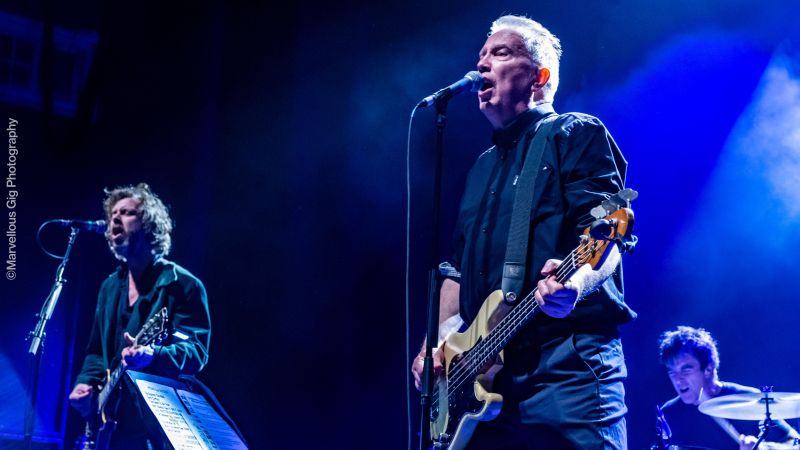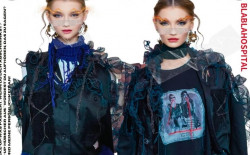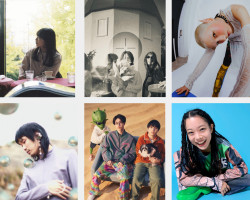
September 1, 2022
Glad to be Human
Musician and activist Tom Robinson's return to Japan
Laurier Tiernan: Hello Mr. Robinson, thank you very much for accepting to do this interview.
Tom Robinson: Well, a pleasure. I mean, I can’t believe I’m finally coming back to Japan. After twenty-five years, to get an invitation was amazing! I haven’t actually played concerts in Japan with a band since the nineties.
LT: I read that you came out at the age of 13, in 1963, because you fell in love with a boy of your own age, and it caused you a lot of emotional difficulties since the UK only decriminalized homosexuality four years later. I can empathize because I lived a similar story in Canada. I want to know, would it be fair to assume that some of the angry songwriting of your early days was a reaction to that experience, and perhaps came from a drive to see society do better?
TR: I wish it had been as simple as that. What actually happened…when I was thirteen…those were very very different times. And, coming out just wasn’t an option, because there was no role model to tell you it was okay to be gay. (There was) nobody to tell you you could have a happy life, and, gay men in Britain went to prison. So, that’s why nobody – even the bravest – could be flamboyantly open, write books or appear on TV. So, if you’re an isolated teenager, who finds yourself in love with someone of the wrong sex, you think you’ve got a cursed life. I would rather have died than tell anybody. And, in the end, that is the option that I chose. I tried to kill myself at sixteen, at school. Luckily, my life was saved by going to a therapeutic community for disturbed adolescents; which could have been a disaster but actually helped me to inhabit my own skin. So, at 23, then I moved to London and decided not to go home to my parents, but to go and live in a big city, live my own life, and be me. And, that’s when I came out. And, it was like a kid being allowed in the sweets shop. Amazing to find yourself part of this bigger community, of people just like you. And, along comes David Bowie at the same time, and he sings You’re not alone! So, I decided if I could ever do that for somebody else – if I ever had a career in music, which I wanted to do – I thought I would do that myself, and pass that forward. You know? And, so, I decided to be out in my music long before I had a proper career.

LT: Do you feel that your songwriting had the impact you would have desired? I mean, did you receive feedback from people that proved that you had opened people’s minds?
TR: Well, having tried in my early twenties in the music business to get a toe hold the conventional way – before punk, I was in a band called Café Society, and we just achieved nothing, and then I was tied up in record contracts, and had to go out and form a band of my own – that’s when we built a relationship directly with the audience for the first time; instead of it being mediated through publicity and interviews and all the rest of it, it was direct between us and the audience. I think the most powerful letter that I received at that time came from a teenager in America. He’d grown up in the midwest, in a farm with religious parents, and he’d just had a row with his mother who told him he was the spawn of Satan, and she wished he had never been born. He was to get out of the house. And, he’d gone up to his room, taken an overdose of sleeping pills, lay down on the bed hoping never to wake up, with the radio on. And, “Glad to be Gay” came on the radio. And, he stuck his finger down his throat, vomited up the pills, packed his bags, and moved to San Francisco. And, that was where he was writing to me from. And, that was the most amazing of all the stories.
But, then, we went to Japan. And, mostly, the audience early on was teenage girls. In 1979 we walked out into what looked like a normal —if you like—teen pop audience; 6 p.m. in the evenings, sitting in rows in the concert halls, not allowed to get up, still in school uniforms, and being expected to just come and passively watch this concert. That was an experience, to meet those people, and then get the letters from those people, and find out what was really going on. And, to our astonishment, we found —actually —they knew all about TRB. They really carefully read all the stuff that had come over in the NME and in Melody Maker. They knew what we were about, and what we stood for. Their command of English—written English—was phenomenal, so very articulate letters came back. And, that’s really the beginning of the relationship with that audience in Japan. And, I’m just so thrilled to have a chance to renew that and give each other a big musical hug.
LT: I read that when your EP Rising Free was released, The BBC banned your anthem “Glad to be Gay”. How did it feel, years later, to be hired as a presenter for all of the BBC’s national stations?
TR: Well, to become a broadcaster was an additional way of communicating. Songwriting is one way. Performing concerts is another way. But, also, making radio programs of different kinds; sometimes to do with music, sometimes to do with social issues. As my music career was declining in the UK in the late 90s, I was reduced to playing acoustic guitar solo gigs in pubs, just to put food on the table. And then, a godsend just out of the blue, a new radio station was started and they offered me a job; BBC 6 Music, actually presenting new music. So, in my 50s and my 60s, I suddenly had a secure job. And, it rekindled my love of music.
LT: Did it feel validating to be hired as a presenter by The BBC which had banned your song?
TR: Well, the answer is that The BBC isn’t a monolith. The BBC has 23,000 employees. So, yes, there was one woman at Radio 1 who decided that “Glad to be Gay” was an immoral song, and put a sticker on the record. So, whatever was decided by management at Radio One was then policy for the rest of the station. But, The BBC also has Radio 4, which is a news, current affairs, and documentaries program…. And, it’s run by lots of different people. And, seven years on, different people had changed at the top of the management, and I had a second hit with a song called “War Baby” after that ban had kind of subsided, and I was able to have a new fresh career in music. So, I was already not banned by The BBC by the time they started employing me. But, the crowning glory is that 50 years on from the decriminalization of homosexuality in the UK, The BBC – the whole BBC – celebrated that, and invited me to come and do a live version of “Glad to be Gay,” live to the nation on the biggest radio station in the country (Radio 2) at the height of the week of the celebrations. That was the validation, was to actually be up there with Will Young and all the big pop stars of the day. So, there was validation. Yeah. That was good.
LT: What is your proudest achievement in your career, and why?
TR: Well now, my proudest achievement, by far, is the Rock Against Racism “Carnival Against the Nazis” in April of 1978, because it’s the only time that you can really point to a concrete achievement; that something happened, you helped make it happen, and, as a result, something else—in this case—didn’t happen. Because, we had a far-right party called The National Front, at the time, which was gaining ground with voters on an anti-immigration ticket. And, posing as a legitimate political party. And, we used to get three parties who would put leaflets through your letterbox at election time; The Conservative party, the Liberal Party, and the Labor party. And, that’s what we understood politics to be in the 1960s. In the 70s, suddenly there were four manifestos; Conservative, Liberal, Labor, and Nazi. And, I knew what happened to gay people in the Nazi time as well as Jewish people, and we had a Jewish lead guitarist in the band. So, when there was a possibility to put on a big free rally, in a park, in London…The Clash agreed to appear, Steel Pulse from Birmingham (who were the leading reggae band of the time), and X-Ray Spex (leading punk band of the time) all appeared at that concert. And, on the day, we thought maybe—if we were lucky—20,000 people would show up. But, in the end, 80,000 people turned up and the National Front was defeated in the following elections. It’s great to have had a small part of that.
LT: As a bisexual person who identifies as “queer,” I received a lot of flack in my youth, for being a fence sitter; from both friends in the queer community and friends in the “straight community”. You yourself were very brave in your insistence that you still see yourself as “gay,” despite having fallen in love with, and having married, a woman. Have you received feedback from people in regards to the fact that this might have broadened people’s minds to the need to accept people as they are, beyond people’s rigid conceptions of what defines stereotypical LGBTQ+ identities?
TR: Absolutely, the world really has changed in so many unexpected ways. I used to think “bisexual” was just a cop-out—it was just something people said if they didn’t want to come out as properly queer—until it happened to me. And, having fallen in love with someone of “the wrong sex” at age 15, I then fell in love with someone of the wrong sex at the age of 34 or 35. It was the wrong sex for a different reason. It was “Shock Horror, Man Lives with Woman!”, which was the last thing that I expected. But, you know, if you find the person you want to spend the rest of your life with, you can’t fuck about.
At first, there was a lot of flack, particularly because it happened at the height of the AIDS crisis. While that didn’t matter within the LGBT community, when the British tabloid press got hold of it as a story, they used it to further their agenda that straight is better than gay. They portrayed me as having switched the binary from A to B; stars who go straight. One of the tabloid papers demanded to come take pictures of our baby. And, they said, If you don’t let us come and take pictures, we’re going to run this story that you’re really going to hate, this Sunday. We’re going to take you to pieces. We went to a publicist and said, How can we stop this from doing this? And, they said, You can’t. Except, by taking your own baby pictures, writing your own press release with your own story in your own words, and giving it to all the other papers the day before. And, in the end, that’s what we did.
So, that year, I went to Pride to sing “Glad to be Gay,” as usual—as I had done for the previous 15 years—and I got booed. Of course. Understandably. So, I wasn’t invited back for the next few years, until things expanded as the world changed. Lesbian and Gay Pride became Lesbian, Gay, Bisexual, and Trans Pride in the mid-90s. And, for the first time, there was a bisexual stage, and they invited me back. It was fantastic. It was rammed with people, and somebody in the audience shouted, Where’ve you been Tom? And, I said, Making babies! And, they all cheered. So, that was like coming home. And, at that point, I stopped trying to insist, I am still a gay man, I just happen to be in love with a woman. And, I went, No, these people have a new and different experience; a new way of being. It’s not new, it had been going on for hundreds of years. But, as an identity, it was an identity that made sense to me. And, so, I decided to embrace “bisexual.” Yes, that’s what I am. Those are my people. I’m proud to be there in that community once more, in a new fluid situation, where we just do say “LGBTQ+,” rather than having to be narrowly G or S. You know, it’s not Gay or Straight; it’s human.
LT: Fantastic! Japan, as you may know, still does not have legislation to protect LGBTQ+ people from discrimination. Do you feel that your playing concerts in Japan can help open people’s minds over here?
TR: I don’t think music changes people’s minds. It’s only a tiny thing. It’s a tiny club in Tokyo. It’s two shows. It’s not going to change the world, realistically. It’s a wider struggle still because Japan also doesn’t have legislation to forbid discrimination against women. The sexism baked into society is outrageous. There is so much potential that could be unleashed; everybody would benefit. You know, what do I know? I can play bass guitar. I can write song lyrics. I’m trying to tell you the solution to Japan’s problems? Of course, I’m talking bollocks. But, allowing women to reach their full potential would also help men, and take the pressure off them.
LT: What things about Japan do you like the most?
TR: I like the playfulness and the humor. There’s this whimsey that you get in Miyazaki films. This sense of the extraordinary takes us beyond the four walls of ordinary dimensional reality. There’s this sense of fantasy, of extraordinary adventure that my kids have grown up with and adored. And, when our eldest was old enough to finish school, we asked our kids, Where do you want to go? And, they both said, Japan. That’s when we came and just had a little family holiday and, they loved it. This has been very much a legacy of that first trip to Japan in 1979, where we made some friends then who’ve just been lifelong friends ever since. It’s just lovely to be able to come back in old age—at 72, and touch base with them—which I thought was a closed chapter by now.
LT: What kind of show can we expect from your shows on September 6th and 7th, at Shinjuku Loft?
TR: Ever since those shows with The High-Lows in the late 90s, I’ve had the same drummer and guitar player. So, it’s a band that’s lasted much longer than any of the earlier bands that I had. So it’s musicians who’ve known each other as people and been friends. And, the reason we play music together, is because we want to; not because we have to. And, I’ve gone back to playing bass at last.
LT: Oh!
TR: Well, I’m a punk rock bassist. I play with a plectrum, and it’s fairly basic; what I do. But, my playing—primitive as it is—is right there at the heart of what drives it along. That’s what TRB was driven by. So, that’s really a joy; to be back on the bass again. So, we managed to do a mixture of TRB classics and songs from the intervening years that people have also liked; and, of course, “War Baby,” and “Listen to the Radio”. It’s a nice mix. It’s been working well in the UK. So…really looking forward to bringing that show to Japan.
LT: Fantastic! Thank you so very much for doing this interview, Mr. Robinson. It’s been an honor!
Tom Robinson is playing two concerts at Shinjuku Loft, on September 6th and 7th.
Tickets
eplus.jp
Concert Information
www.loft-prj.co.jp
Tom Robinson’s Official Homepage
tomrobinson.com







